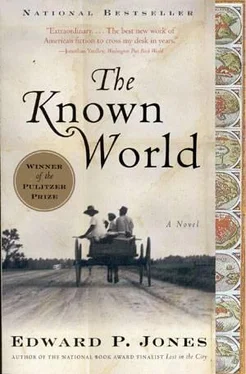Topps told her that for 15 cents a head every two months, her property, each working slave over five years old, would be protected from just about everything God could think up: Getting kicked in the head by a mule while working a field. Dying from tainted food-as long as a doctor could certify the food was not simply rancid and that any normal person could have eaten it and not have the same death visited upon him. Breaking a neck in a well after falling down in it while cleaning it out. Getting bit by a snake of one foot or longer while working in the fields or the barn or the smokehouse or the tobacco barn or the corncrib; said snake, alive or dead, with suitably missing fang or fangs, would have to be produced to collect on the policy. Slave death by mad dogs in fall, winter or spring was compensable; canine madness in the summer was an “ordinary act of God,” to be expected, so the policy was mute about that season. Nothing came from the loss of an arm or of one or both eyes, because such losses were not the best indicia of how much work a slave could still perform. Being hurt in any fashion by duly authorized slave catchers was compensable; plain citizens, opportunistic slave catchers just out to make a dollar, hurting a runaway would make that provision in the policy null and void. Being killed or injured by a neighbor while walking across a neighbor’s property while on some errand “of consequence” for the master or the mistress or their issue. No money for a slave hurt or killed by someone while said slave was visiting his family on another plantation. Being accidentally shot while assisting the master/mistress/their issue while hunting or while traveling with said people as long as travel was of three days duration or longer. Being struck by lightning while working in the field as long as recuperation was less than three days and as long as the slave had not been given sufficient warning that lightning was about to strike. Death by lightning was not compensable; such deaths were simply another “ordinary act of God” that “the Company, in its wisdom, could not reward.”
For a total of just one dollar every month Caldonia would receive three-fifths the value of any runaway slave who was not caught within two months. Topps stated that a separate policy to protect against “plain old natural death” was 10 cents a head every other month, but Caldonia decided to stay with just the 15 cents policies, “for now.” Fern Elston had stopped listening and left the room long before Maude began to point out that most of the slaves in the cemeteries in Manchester County had died while working, so there was no use insuring for ordinary dying. She also noted that most of the slave chaps who had died of natural causes were too young to be covered. “That is a fact,” Maude said with some authority.
“So,” Topps said as he finalized everything, “there will be no protection at this time on the perishment of your human property.” “Perishment,” or natural death, was a word the people at Atlas used very often, and no one used it more than the widowed Topps, who saw himself as one day ascending to an important position at the home office in Hartford, Connecticut, and looking down over the land and dispensing wisdom learned from years toiling in the wilderness of the uninsured. The word perishment had been thought up by a man at the Hartford office to try to convey the fragility of human life, especially that of slaves, and to try to get across to a customer the utter need for Atlas’s policies on those lives, slave or otherwise. The man at the Hartford headquarters, who had never seen an American slave except in newspapers and magazines, was something of a poet and had brought over two books of his poems when he emigrated from Poland. At about the time he came up with the word perishment, a publisher in Bridgeport, Connecticut, had agreed to publish the books but felt that one of them was “too suffused with the weave” of Poland. “Forget Poland,” the publisher wrote the poet. “I can’t even find the damn thing on my map.” He promised to publish both books if the perishment poet could reweave the Polish one, and the poet was thinking it over at the time Henry Townsend died. There was no money in either book, the Bridgeport publisher wrote the poet, but there was the promise of glory and remembrance and the adoration of a public hungry for the real truth of America. It was well known, even by a foreigner in an insurance fortress miles away in Hartford, that from his cubbyhole of an office in Bridgeport the publisher was as good as his word.
All of Caldonia’s guests, except her mother, would stay until Sunday, when Elias and Louis went out to search for Moses and Gloria and Clement. Only the former, the man, the former overseer, would be found.
12 Sunday. Barnum Kinsey in Missouri. Finding a Lost Loved One.
That morning, Sunday, Skiffington woke with the first real idea of where Moses was. He remembered what Elias had said about the runaway being “world-stupid.” It was as clear as anything and he wondered why God had not put the notion into his head before. Maybe, he thought as he sat on the side of the bed and watched the sun at his feet, he himself had put Mildred Townsend’s place beyond consideration because he had not been able to bring Augustus back to her. And, too, the place was on the way south, the opposite of where a runaway slave might want to be. But God, working in his own time, had now put in his head the notion of where the murderer was. Skiffington had a feeling, based on what he knew about crime and criminals, that Moses was still there, but he sensed that if he did not get to Mildred’s place soon, the escaped slave would be gone. And he also had a feeling, somewhat fainter than the first, that if Moses had killed his own woman and boy and the madwoman Alice, then he might have killed Mildred, simply because killing was now in his blood.
That Sunday, too, he awoke with the same toothache that had claimed him for many days. He had had some relief the day before but now it was back, a throbbing and insistent lump of pain bedded down on the left side of his face. He told himself he could live with it. Monday would be too late to go after the slave Moses and the other two. Still on the side of the bed, he lowered his head and prayed. His wife was downstairs with Minerva and his father. There would be no time for church services today. Ordinarily, he would have gone to get the tooth pulled at the undertaker, who doubled as the town dentist, but the undertaker had been three days in Charleston, caring for a bachelor brother who had no wife or slaves to do the looking after. Skiffington could have gone to the white doctor, but he and the doctor had not spoken in four years. The doctor had complained for a long time to Skiffington that the sheriff’s Shetland sheepdog had been killing the doctor’s chickens. With no sheep to run after, the doctor told Winifred, the dog had been taking it out on his chickens. Skiffington had believed that he had trained the dog well and the doctor should look elsewhere in the neighborhood for the culprit. “Suspect” was the way Skiffington had put it.
Then, one mild Monday morning after Skiffington had gone off to the jail, the doctor stepped out into his backyard and saw the dog walking casually toward his chicken coop. The dog turned and, almost mesmerized, looked for the longest into the doctor’s eyes, long enough for the doctor to call to his slave for his pistol. He shot the dog four times, twice in the head and twice in the body. Then he had his slave pick up the corpse and throw it into Skiffington’s yard.
Skiffington now dressed and left the house without a meal. He didn’t tell Winifred about the toothache because she would have fussed some more. He found Counsel in the jail cleaning his gun, and the sight of his cousin working away on a Sunday angered him. He had told him about being in the jail on Sunday when there wasn’t a prisoner but Counsel was hardheaded. Counsel was whistling a tune and Skiffington, stepping two feet into the office, thought the words that went with the tune were probably dirty ones.
Читать дальше












